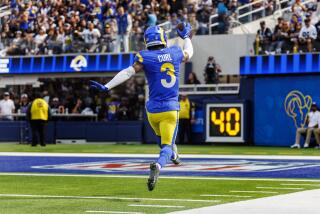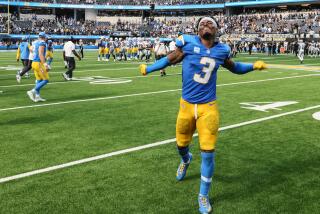A New Scoring Machine
- Share via
The proposition that the Oakland Raiders are finally a Super Bowl team again this season will be tested, for perhaps the last time, in the game of the week Monday night at Denver.
If the Raiders win that one, their bright future will be more fact than proposition.
For there’s nothing much left on their schedule except teams that don’t score much, teams like Pittsburgh and Atlanta and Seattle.
Even the opponents they’re likely to get in the playoffs, Indianapolis and Tennessee, don’t score very often; and, lately, Indianapolis hasn’t even won very often.
The Raiders, who blasted Kansas City the other day, 49-31, on a big afternoon for quarterback Rich Gannon and running back Tyrone Wheatley, are a scoring machine when they put their minds to it--reminiscent of the days when the St. Louis Rams had Kurt Warner and Marshall Faulk.
And that’s Oakland’s edge.
Two-Way Threat Does It
Not long ago when the Rams and Raiders were based in Los Angeles, there was always a chance that both would reach the Super Bowl in the NFL equivalent of baseball’s subway series.
This season, there’s even a better chance they’ll both get that far; and in each instance, the explanation is the same.
Assuming that all hands are uninjured, it’s the two-way Warner-Faulk threat that drives the Rams, who lost at home against Carolina the other day, 27-24, while playing without Warner and Faulk.
At Oakland, even though Wheatley was well under 100 percent physically, it was their two-way offensive threat that drove the Raiders past Kansas City.
As Wheatley ran for 112 yards and Gannon passed for four touchdowns, the Raiders looked like the best team in football.
Someone Teaching Wheatley
Most pro clubs assume that running backs don’t have to be taught, that ballcarrying is instinctive.
And maybe in most cases that’s true.
But when Wheatley joined the Raiders in August, 1999, he didn’t seem to be much running back, whereas, in November, 2000, he is.
By August, 1999, two NFL teams had given up on him--two that badly needed running backs, the New York Giants, who in 1995 had drafted Wheatley on the first round, and the Miami Dolphins, who in their Dan Marino days always appeared to be one running back short of the Super Bowl.
Jimmy Johnson, the Miami coach from 1996-99, would probably still be in football if he could have taught Wheatley how to run the ball.
At Oakland, someone’s taught him--and that someone is probably running-back coach Skip Peete, Willie’s son and Rodney’s brother, who, until he moved to the Raiders in 1998, had spent virtually his whole career in college football--where the good coaches don’t assume, they teach.
In August, 1999, moreover, somebody at Oakland saw something in Wheatley at a time when nobody else did, and that somebody could have been Peete or Jon Gruden, the coach, or Al Davis, the owner.
Such a thing has happened before in the Davis organization.
Over and over and over.
Raiders Foil Pass Defense
On a San Diego playing field, Oakland’s G-Men, Gannon and Gruden, were held without a touchdown only seven days before their seven-touchdown explosion against Kansas City--but the 15-13 victory over the Chargers that day was accomplished by an unemotional Raider team.
During the long season, good teams have to take some opponents in stride, for no pro club can be emotionally ready every Sunday.
And the test on such days is not whether you score, it’s whether you win.
In the Oakland-Kansas City game, it was the Chiefs’ pass defense that was tested--and failed.
While Gannon was going for the 14-0 first-quarter lead that took the suspense out of the game, he converted on four consecutive third-down passes--on third and four, third and three, third and seven, and third and 17--and such plays are almost always a test of the defense, not the passer.
It’s a football truism that on third-down plays, the good defense almost always finds a way to handle the good passer.
Defensively, however, the Chiefs failed to get a grip on all the Oakland talent--on Tim Brown and Andre Rison, on James Jett and Rickey Dudley, on Napoleon Kaufman and Gannon and Wheatley.
A Five-Hundred-Yard Passer
On offense at Oakland, the Chiefs were good enough to win, and, probably, they would have won if their defensive team had played with even a modicum of success.
It was following a 3-3 start this season that Coach Gunther Cunningham, impressed with the Ram offense, converted the Chiefs into a passing team, whereupon they became the first to outscore the Rams, 54-34.
Against the Raider defense, the quarterback of the Chiefs, Elvis Grbac, became the NFL’s eighth 500-yard passer of all time.
The first of the eight, Norm Van Brocklin of the 1951 Los Angeles Rams, also won the NFL championship with a long pass that year.
In championship terms, the difference between him and Grbac is that Van Brocklin had a defense.
The specialists in what academics call the scientific method maintain that no procedure is valid until someone replicates it.
That has been Cunningham’s role this year in Kansas City.
He has validated the worth of the Ram pass offense.
He alone has done that so far in a league full of dull, conservative, run-minded coaches who, evidently worrying about their jobs, seem content to score 15 points or 17 or 8 or 3.
But to win football games, any good offensive team needs some defense.
Tennessee Coach Wakes Up
The Tennessee Titans, with some of the most gifted personnel in football, were playing their usual stodgy game the other day, piling up a 6-0 lead on two field goals, when another stodgy team, Pittsburgh, suddenly shocked them with a touchdown pass to seize a 7-6 lead in the fourth quarter.
That woke up Tennessee Coach Jeff Fisher, who, just in time, authorized quarterback Steve McNair to throw the passes that beat the Steelers with a final-minute field goal.
Last winter, the Titans nearly won the Super Bowl with Fisher’s strange strategy; and they should win it this time because he and his front office have rounded up better players than the other pro clubs have, McNair among them, along with running back Eddie George and some fast, classy pass receivers and defensive people.
McNair isn’t the NFL’s best quarterback, but he’s up there, and George is one of the league’s great ballcarriers.
Fisher, however, makes everything harder than is reasonable or necessary--or prudent--on McNair and the other Titans, not to mention the people of Nashville, and the state of Tennessee, and the rest of us.
The Running-Play Syndrome
There was no good reason for the Dallas Cowboys to lose a 16-13 game at Philadelphia the other day.
They had the better team with the better quarterback, Randall Cunningham, who on the rare occasions when he threw the ball on first-down plays, or in short yardage, passed impressively.
But Cunningham’s new coach, Dave Campo, is one of the NFL’s dull conservatives.
And here’s how those people think:
On one first-half play, Cunningham beat the Eagle blitz with a smart scramble, then threw an accurate downfield pass 40 yards to wide receiver James McKnight.
On the next play, Campo called for a run--which lost four yards.
The run knocked the Cowboys out of scoring position and led to another failed possession.
It was as if after Cunningham’s big play, Campo told himself, “We can pass--now let’s show ‘em we can run.”
The question is why?
You can keep track of this syndrome yourself:
Almost every time that any low-scoring team somehow completes a big pass, it will run the ball on the next play.
The question is why?
You Can Stuff Stewart
Another thing that dull conservatives repeatedly do--without understanding, apparently, why they should--is run the ball without success on successive plays.
Thus at Detroit the other day, while the Lions were losing to the Miami Dolphins, 23-8, running back James Stewart carried it three times in a row for Detroit with these results:
On first down, he was stuffed.
On second and 10, he gained nine yards.
On third and one, he was stuffed again.
It seemed all too clear why this happened to Stewart--clear, that is, to any football fan counting the defensive people arrayed against the running back on each play--if not to Stewart:
On first down, he failed against an overloaded run defense.
On second down, he beat the pass defense that Miami’s coaches expected.
On third and short, he had no chance against another run defense.
The running-play enthusiasts in the crowd, and on the Detroit coaching staff, watching Stewart nearly break away on second and 10, were doubtless crying out, “Man, look at him run--let’s run some more.”
The hard truth, however, is that most of the NFL’s big runs develop on draw plays or other fake passes on passing downs--identifying a passing down as second and long or third and three or more.
You can keep track of this yourself.
Ivy Passer in Playoffs
The way things are going, Dan Marino’s successor at Miami, Jay Fielder--who played at Dartmouth--is all but certain to become one of the few Ivy League quarterbacks ever to reach the playoffs as NFL starters.
And as Fiedler downed the Detroit defense, there seemed to be two reasons why this is happening to him:
First, Miami’s conservative coaches are obviously authorizing few Fiedler passes, only 18 against Detroit, of which he completed 13--all of which is easier for any quarterback than throwing 50 times.
Second, when he does throw, he demonstrates that he has the arm as well as the temperament of a good NFL passer.
For example, to set up Miami’s 17-0 field-goal play, Fiedler took no chances on a drive-killing interception while accurately throwing and completing a deep sideline pass--the trademark play for any pro quarterback.
The Dolphins’ new coach, Dave Wannstedt, who has improved on his 1993-98 performance as the leader of the Chicago Bears--whom he led to a 41-57 record- -isn’t going to win many playoff games from Oakland or Tennessee or even Baltimore with 18 passes a day.
But as Wannstedt and Fiedler advance cautiously toward the playoffs, they’re aware of one thing:
The playoffs are every NFL person’s first objective.


